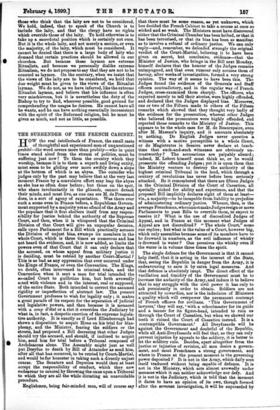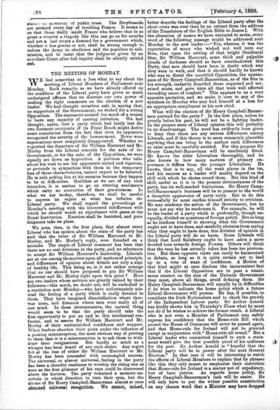THE SURRENDER OF THE FRENCH CABINET. H OW the real intellectuels
of France, the small caste of thoughtful and experienced men of unquestioned probite—the word covers more than probity—who in quiet times stand aloof from the stream of politics, must be suffering just now ! To them the country which they worship, because it is to them a superb and living entity, must seem to be gliding ever more swiftly down a slope at the bottom of which is an abyss. The outsider who judges only by the past may believe that at the very last moment France by a convulsive effort may leap the abyss as she has so often done before ; but those on the spot, who share involuntarily in the glissade, cannot detach their minds, and must live, as one can see M. de Pressense does, in a sort of agony of expectation. Was there ever such a scene even in France before, a Republican Govern- ment supported by a majority yet so afraid of the Army and the populace that it first shelters itself from any respon- sibility for justice behind the authority of the Supreme Court, and then, when it is whispered that the Criminal Division of that Court will give an unpopular decision, calls upon Parliament for a Bill which practically accuses the Division of unjust bias, swamps its members in the whole Court, which is three times as numerous and has not heard the evidence, and, it is now added, so limits the powers even of that Court that it can only declare that the accused, on whose appeal from military justice it is deciding, must be retried by another Court-Martial ? This is as bad as any oppression that ever occurred under the Kings of France, or even the Convention. The Kings, no doubt, often intervened in criminal trials, and the Convention when it sent a man for trial intended the so-called Court to guillotine him, but both avowedly acted with violence and in the interest, real or supposed, of the entire State. Both intended to correct the assumed rigidity or imperfection of abstract law. The present Government professes to wish for legality only ; it makes a great parade of its respect for the separation of judicial and legislative powers, and then because it is menaced with a coup d' &at or a riot it overrides the Judiciary by what is, in fact, a despotic exertion of the supreme legisla- tive authority. It is exactly as if Lord Ellenborough had shown a disposition to acquit Hone on his trial for blas- phemy, and the Ministry, fearing the soldiers or the streets, had proposed a Bill decreeing that other Judges should try the accused, and should, if inclined to acquit him, send him for trial before a Tribunal composed of Archdeacons alone. The Assembly might just as well put Dreyfus to death by Bill of Attainder as send him, after all that has occurred, to be retried by Court-Martial, and would be far honester in taking such a directly unjust course. The Senators and Deputies would then at least accept the responsibility of conduct, which they now endeavour to conceal by throwing the onus upon a Tribunal to which they are all the while dictating an unavoidable procedure.
Englishmen, being fair-minded men, will of course say that there must be some -reason, as yet unknown, which has decided the French Cabinet to take a course at once so wicked and so weak. The Ministers must have discovered either that the Criminal Chamber has been bribed, or that it has been terrorised, or that its bias has been so manifest as to involve a refusal of ordinary justice. We can only reply—and, remember, we defended strongly the original verdict of the Court-Martial, believing it to have been given on secret, but conclusive, evidence—that the Minister of Justice, who brings in the Bill next Monday, himself declares that the honour of the Judges remains unimpugned, and that even rumour only accuses them of having, after weeks of investigation, formed a very strong opinion. The way of it seems to have been this. The Judges found the evidence of the Generals and Staff officers contradictory, and in the regular way of French Judges, cross-examined them sharply. The officers, who expected merely to tell their stories, were highly offended, and declared that the Judges displayed bias. Moreover, one or two of the Fifteen made to others of the Fifteen remarks which showed that they thought very badly of the evidence for the prosecution, whereat other Judges who believed the prosecutors were highly offended, and reported those remarks to the Ministry of Justice. This appears to be the whole case for M. de Beaurepaire, even after M. Mazeau's inquiry, and it amounts absolutely to nothing. Do English Judges never question a witness with a motive perceptible to a whole Court, or do Magistrates in Session never declare at lunch- time that such-and-such witnesses are obviously un- trustworthy ? The accusations are palpably absurd ; indeed, M. Lebret himself must think so, or he would prosecute the offending Judges ; yet it is upon them that the Ministry venture to destroy the authority of the highest criminal Tribunal in the land, which through a century of revolutions has never before been seriously attacked. Be it remembered that there are fifteen Judges in the Criminal Division of the Court of Cessation, all specially picked for ability and experience, and that the proposed Bill implicitly declares eight of them at least— viz., a majority—to be incapable from liability to prejudice of administering ordinary justice. Whence, then, is the average Frenchman, who cannotmake Judges resign or move Parliaments to pass Bills to override them, to expect to receive it? What is the use of discredited Judges of Appeal, and in France at this moment what Judges of Appeal are not discredited ? " The whole Court," some one replies ; but what is the value of a Court, however big, which only assembles because some of its members have to be drowned in numbers, as the evil influence of whisky is drowned in water ? One perceives the whisky oven if the water is in volume three times the spirit.
The single defence for the Government is that it cannot help itself, that it is acting in the interest of the State, that, seeing the Republic in danger from the Army, it is endeavouring to save it by extra legal measures. And that defence is absolutely inept. The direct effect of the vacillation and timidity of the Government must be to increase the audacity of the Army, and induce it to believe that in any struggle with the civil power it has only to ask persistently in order to obtain. Soldiers are not attracted by cowardice, nor is the indecision of Ministers a quality which will overpower the permanent contempt of French officers for civilians. This Government of lawyers,' they will say,' with a schoolmaster for its guide and a tanner for its figure-head, intended to ruin us through the Court of Caseation, but when we showed our teeth it ruined the Court of Caseation instead. It is a contemptible Government.' All Dreyfusards will be against the Government and doubtful of the Republic, while all Anti-Dreyfusards will feel that, as they can only prevent injustice by appeals to the soldiery, it is better to let the soldiery rule. Besides, apart altogether from the justice or injustice of revision, all men desire a govern- ment, and most Frenchmen a strong government, and where in France at the present moment is the governing power deposited ? It is not in the Army, which daily sees itself traduced without being capable of defence. It is not in the Ministry, which acts almost avowedly under menaces which it can neither acknowledge nor defy. And it is not in the Judiciary, which is told that the moment it dares to have an opinion of its own, though formed after the severest investigation, it will be superseded by state., ti.s unworthy of public trust. The Dreyfusards are accused every day of insulting France. It seems to us that those really insult France who believe that in so great a country a tragedy like this can go on for months and not a- last create a demand for a government which, whether it has genius or not, shall be strong enough to reduce the Army to obedience and the populace to sub- mission, and to insist that the judgment given by an appellate Court after full inquiry shall be silently carried oat.



































 Previous page
Previous page